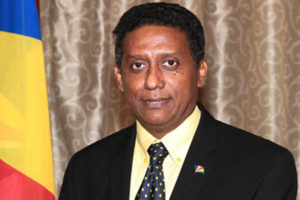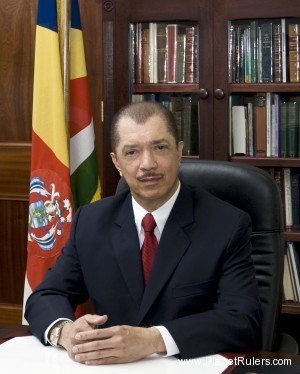Wavel Ramkalawan, President of Seychelles (Elected on Oct 24, 2020 with 54.9%)
 Wavel Ramkalawan (born 15 March 1961) is a Seychellois politician and Anglican priest who has been serving as the President of the Republic of Seychelles since 26 October 2020. Ramkalawan was an opposition MP from 1993 to 2011 and 2016 to 2020. He also served as the Leader of the Opposition from 1998 to 2011 and 2016 to 2020. On 25 October 2020, Ramkalawan won the presidential election, the first such victory for an opposition candidate since independence.
Wavel Ramkalawan (born 15 March 1961) is a Seychellois politician and Anglican priest who has been serving as the President of the Republic of Seychelles since 26 October 2020. Ramkalawan was an opposition MP from 1993 to 2011 and 2016 to 2020. He also served as the Leader of the Opposition from 1998 to 2011 and 2016 to 2020. On 25 October 2020, Ramkalawan won the presidential election, the first such victory for an opposition candidate since independence.
Wavel Ramkalawan was born in Mahé, the principal island of Seychelles. He was born into a modest family, the youngest of three children. His grandfather was from Bihar, India. His father was a tinsmith and his mother a head teacher. Ramkalawan’s primary and secondary education were at Seychelles College, the elite boys’ school of the country.[1] Ramkalawan was ordained as a priest in 1985 following theological studies at St Paul’s Theological College in Mauritius, and thereafter followed further studies in theology at Birmingham University.[1] Returning to Seychelles, he worked in several parishes in Seychelles, rising to become priest-in-charge of the parish of The Holy Saviour.
Danny Faure, Former President of Seychelles (since Oct 16, 2016)
 Danny Faure (born 8 May 1962) is a Seychellois politician who has been President of Seychelles since 16 October 2016. Previously he served as Vice President of Seychelles from 2010 to 2016. Faure is a member of the People’s Party (PP).
Danny Faure (born 8 May 1962) is a Seychellois politician who has been President of Seychelles since 16 October 2016. Previously he served as Vice President of Seychelles from 2010 to 2016. Faure is a member of the People’s Party (PP).
Faure was born to Seychellois parents in the western Ugandan town of Kilembe. He completed his primary and secondary education in Seychelles. He studied at a university in Cuba, graduating with a degree in political science.
In 1985, at the age of 23, Faure started working as an assistant curriculum officer at the Seychelles education ministry. He also worked as a lecturer at both the National Youth Service and the Seychelles Polytechnic.
In 1993, following the return of multiparty democracy to the island nation, Faure became the leader of government business in the National Assembly, serving in that capacity until 1998. That year, he was appointed as Minister of Education. Over the years, he has served in various ministerial capacities including youth, finance, trade and industries, public administration and information and communication technology.
In 2006, he was appointed as Minister of Finance by President James Michel. During his tenure at finance, Seychelles embarked on a a series of economic reforms, recommended by the International Monetary Fund. Faure oversaw the first generation reforms, which ran from October 2008 to October 2013. Faure served as designated minister between 2004 to 2010. He became Vice President on 1 July 2010, while retaining the finance portfolio.
Source: https://en.wikipedia.org/wiki/Danny_Faure
James Michel, Former President of Seychelles (re-elected on Dec 18, 2015 with 50.2% of the votes)

Michel followed President René through different political posts during all periods of the Seychelles’ history as an independent entity. He was a member of the Executive Committee of the Seychelles People’s United Party from 1974 to 1977; subsequently, when the party was transformed into the Seychelles People’s Progressive Front (SPPF), he became a member of its Central Executive Committee. René staged a coup against the country’s first President, James Mancham, only one year after independence, and Michel was appointed as Minister of Public Administration and Information in June 1977. During the 1977–1993 one-party socialist rule, Michel held various ruling party and ministerial portfolios. In 1984 he became the SPPF’s Deputy Secretary-General, and in 1994 he became its Secretary-General.
During the rule of President René, Michel was the head of the Seychellois economy on several occasions. In these 27 years, the Seychelles experienced a period of economic growth based on its tourism and fishery sectors, which was followed by stagnation in the 1990s. Starting from 2008, Michel has presided over a macro-economic reform program, leading to a massive reduction in budget deficit and complete liberalization of foreign exchange transactions.
Michel also played a major role in the country’s democratisation process, which started with multi-party elections in 1993. However, according to the opposition, Seychelles still suffers from limited freedom and transparency of the press and rigged election, although all elections held since have been certified free and fair by international observers. According to official results, President René and his Seychelles People’s Progressive Front party won presidential and legislative elections in 2001 and 2002 respectively, with about 54% of the vote in both cases.
After serving as Vice-President for nearly eight years, beginning in August 1996, Michel became President in April 2004, when René stepped down. At that point, Michel was René’s longest-serving cabinet minister. As President, he currently holds the portfolios of Defence, Police, Information, and Risk & Disaster Management.
Seychelles’ opposition leader, Wavel Ramkalawan, has expressed increased concern over the negative trends in the national economy and demanded more dialogue with the ruling party. The leader of the Seychelles National Party furthermore said that he would be cooperating with President Michel.
Michel won the presidential election held on 28–30 July 2006, taking 53.7% of the vote. He was sworn in for his new term on 1 August 2006. Michel won re-election in May 2011, receiving 55.4 of the vote. He was sworn in for his new term of office on 22 May 2011.
In early 2015, Michel confirmed that he planned to run for a third term in the next presidential election. Reflecting on his time in office, he said: “I worked hard, I did everything for Seychelles [and] the Seychellois people and I feel that people appreciate my work.”[4] His term was scheduled to end in 2016, but he announced on 1 October 2015 that the next election would be held a few months earlier. The date was subsequently set for 3–5 December 2015.
Source: https://en.wikipedia.org/wiki/James_Michel

